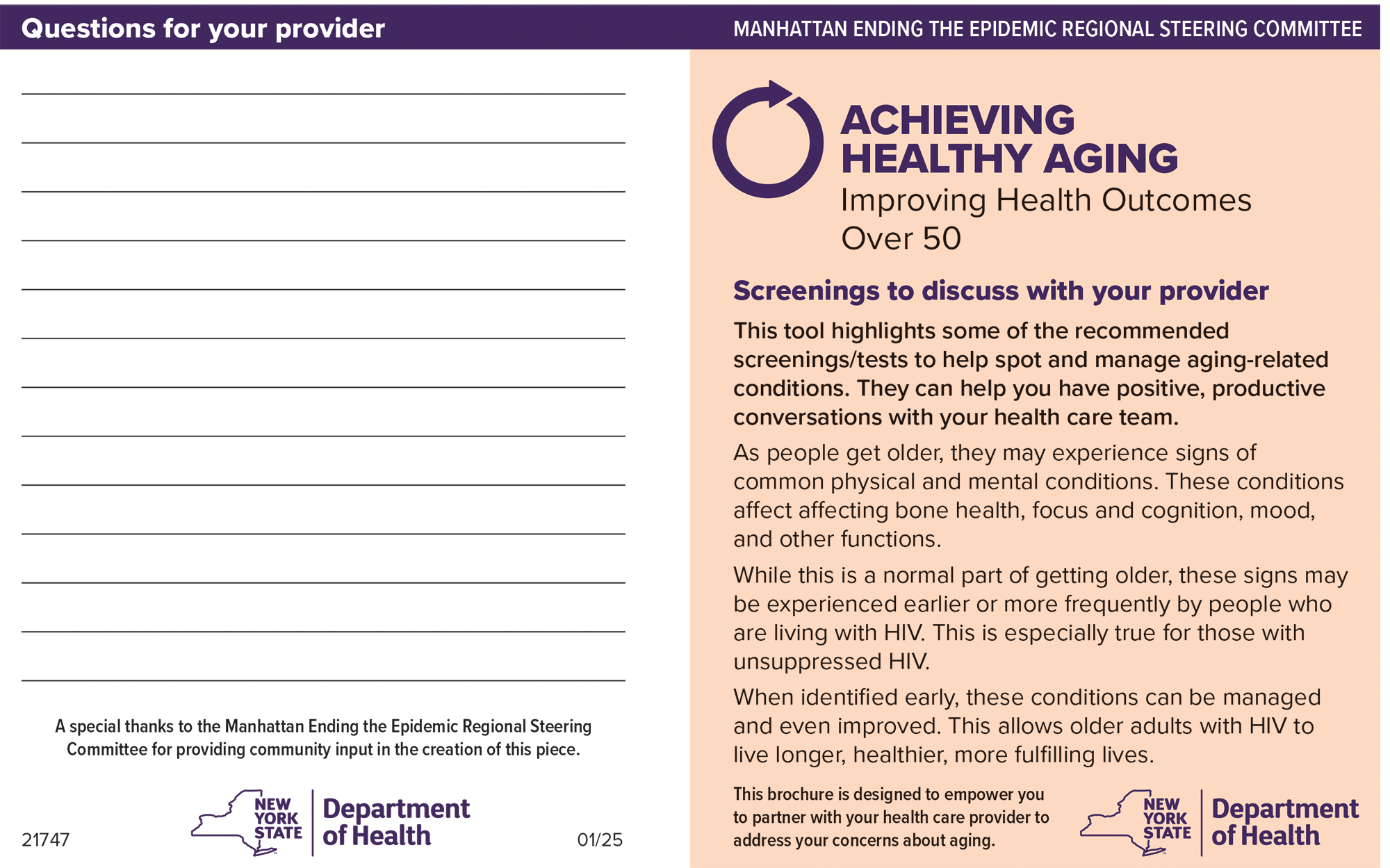As people living with HIV get older, they often face an accelerated onset of aging-related conditions that can affect both their mental and physical health. However, many healthcare providers who treat people with HIV do not have special expertise in aging — and can mistake symptoms of something more serious for the natural aging process.
When identified early, aging-related conditions can be managed, and even ameliorated, so it is important to empower older people living with HIV to spot them and get proper treatment, said Christopher Culp, the director of ACRIA Center for HIV and Aging at GMHC. That way, they can live longer, healthier, more fulfilling lives.
To do that, GMHC is piloting a new tool from the New York State Department of Health that better equips people over age 50 and living with HIV to advocate for the healthcare they need. Developed by the Manhattan Ending the Epidemic (ETE) Steering Committee with community input, the pocket-size booklet provides a list of age-related screenings and tests for people aging with HIV to discuss with healthcare providers. The nine recommended screenings range from mental health to bone density, mobility, heart disease, and kidney function. The guide also includes space for consumers to write down advance questions for their health care provider.
“This booklet gives consumers a tool to go into their doctor appointment and advocate for tests they should be getting,” Culp said. “It’s a useful and powerful tool, which is why we are working to raise awareness about it.”
Called “Achieving Healthy Aging: Improving Health Outcomes Over 50,” the project is led by Manhattan ETE Steering Committee members Jules Levin, the executive director of the National AIDS Treatment Advocacy Program, and Lawrence Francis, a community engagement consultant for HIV, Older Adults, and Strategic Planning at the New York State Department of Health.
Because of his background as an HIV educator, Culp is helping to educate both healthcare consumers and providers on using the booklet effectively. He has already crafted a skills-building presentation for consumers that he is sharing in the community. It aims to address their questions and concerns in advance, then offers an opportunity to practice what to say to a provider. That way, he explained, “you do not feel intimidated and can advocate for what you need when you go into the doctor’s office.”
GMHC’s role
GMHC is an early user of the Healthy Aging guide, thanks to an initial 200-booklet print run from Housing Works. New York residents and organizations will soon be able to request up to 200 printed booklets for free from the NYS Department of Health, and it is also available as a PDF.
Culp has presented to GMHC staff across departments on how to use the guide, so they can get the booklets into clients’ hands and educate them as well. “This is part of our capacity–building to empower older people living with HIV to advocate for themselves,” he explained. “At ACRIA, our work is to build up people’s skills and confidence, so they can take a more active part in their healthcare.”
“Right now, the focus is on getting the guide to consumers, and then to people who work with older adults,” Culp said. That includes healthcare providers, other community-based organizations, and senior centers.
Culp, along with Levin and Francis, have been making presentations on using the guide at the ETE Steering Committees for all five New York City boroughs. They will be doing the same for the boroughs’ New York Knows chapters, which focus on HIV education and testing. After that, they will turn their efforts to statewide meetings.
ETE meetings are open to anyone interested in ending the HIV/AIDS epidemic, so they are a central node for raising awareness about the guide, Culp said. He noted that they are attended by people living with HIV, healthcare providers, and representatives from NYC community groups, health insurance providers, and pharmacies.
To educate healthcare providers, Culp will be presenting the Healthy Aging guide through ACRIA’s regular partner engagement meetings and at GMHC’s annual HIV & Aging Conference in June. “We want to get it out there in all the ways that we can,” he said.
To attend one of the ETE meetings, please contact Christopher Culp at christopherc@gmhc.org or Housing Works Program Coordinator Ellie Goldfarb at E.Goldfarb@housingworks.org.
Stay in the Know
Sign up to receive our monthly newsletter, updates about events, and other helpful information.

